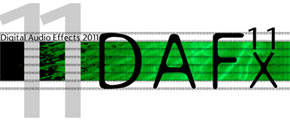► Keynotes
Whole program here
| Keynote 1 |
| ►Udo Zoelzer |
| ►Pitch-based Digital Audio Effects |
Bio: Udo Zölzer received the Diplom-Ingenieur degree in electrical engineering from the University of Paderborn in 1985, the Dr.-Ingenieur degree from the Technical University Hamburg-Harburg (TUHH) in 1989 and completed a Habilitation in communications engineering at the TUHH in 1997. Since 1999 he has been a professor and head of the Department of Signal Processing and Communications at the Helmut Schmidt University – University of the Federal Armed Forces in Hamburg, Germany. His research interests are audio and video signal processing and communication.
Abstract: Digital audio effects are usually controlled by certain parameters of users and the incoming audio signal. The combination of user defined parameters and signal adaptive parameters leads to more exiting audio effects where the main effect parameters change according the audio input. The talk will cover several pitch-based audio effects, will discuss detection algorithms and special effect realizations.
| Keynote2 |
| ► David Zicarelli |
| ► “Recent developments in signal processing editing and visualization” |
Bio: David Zicarelli is the founder of Cycling ’74, developers of Max/MSP/Jitter, and has been working on the Max environment since 1988. Over the past 25 years he has done audio software development and research at CCRMA, IRCAM, Opcode Systems, Intelligent Music, AT&T, and Gibson Guitar.
Abstract: Over the past several decades, interactive domain-specific languages that permit the development of signal processing algorithms visually have become commonplace. I describe the advantages and disadvantages of working on algorithms in a visual way, considering factors such as cognition, performance, and reusability. Finally, I will present our recent work in visual editing of generalized synchronous DSP graphs, domain-specific graphs, visual performance monitoring, and filter design.
| Keynote 3 |
| ► Patrick Flandrin |
| ► “Fourier + 200″ |
Bio: Patrick Flandrin is a CNRS Senior Researcher, working in the Physics Department of ENS de Lyon, France. His research interests are mostly in nonstationary signal processing (time-frequency/time-scale methods), scaling processes and complex systems. He published over 250 journal or conference papers in those areas, contributed several chapters to collective books and authored one book. He has been awarded the Philip Morris Scientific Prize in Mathematics (1991), the SPIE Wavelet Pioneer Award (2001), the Prix Michel Monpetit from the French Academy of Sciences (2001) and the Silver Medal from CNRS (2010). Fellow of IEEE (2002) and EURASIP (2009), he has been elected Member of the French Academy of Sciences in 2010.
Abstract: Exactly 200 years ago, Joseph Fourier wrote his fundamental essay on heat diffusion, introducing mathematical tools that have been — and still are — central in the development of signal analysis and processing. Many variations around Fourier’s seminal approach have then been proposed, especially for the sake of facing time-varying and/or nonstationary situations. The purpose of this talk is to present and illustrate some recent methodological advances in such directions, from wavelet-like transforms to sparse time-frequency distributions and oscillations-based empirical mode decompositions.


